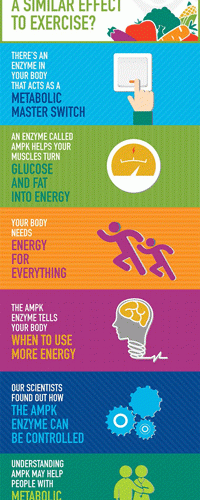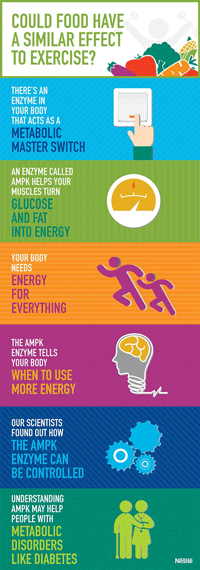Unlocking the metabolic ‘master switch’ to potentially echo exercise effect
- Like
- Digg
- Del
- Tumblr
- VKontakte
- Buffer
- Love This
- Odnoklassniki
- Meneame
- Blogger
- Amazon
- Yahoo Mail
- Gmail
- AOL
- Newsvine
- HackerNews
- Evernote
- MySpace
- Mail.ru
- Viadeo
- Line
- Comments
- Yummly
- SMS
- Viber
- Telegram
- Subscribe
- Skype
- Facebook Messenger
- Kakao
- LiveJournal
- Yammer
- Edgar
- Fintel
- Mix
- Instapaper
- Copy Link
Posted: 19 November 2014 | Nestlé | No comments yet
Research by Nestlé scientists suggests that future food and nutritional products could emulate the effects of exercise on the body’s metabolism…


METABOLIC MASTER SWITCH. Image: Nestlé
Research by Nestlé scientists suggests that future food and nutritional products could emulate the effects of exercise on the body’s metabolism.
These products would help maintain a healthy energy balance – achieved by balancing nutrients taken in with those consumed or stored – by using the same cellular mechanisms normally activated by exercise.
This would benefit those having difficulties remaining active due to lifestyle, old age, disease or disability.


METABOLIC MASTER SWITCH. Image: Nestlé
Scientists at the Nestlé Institute of Health Sciences examined how our metabolism is regulated by a ‘master molecule’ which controls the energy balance of the body.
The findings, published in the Journal Chemistry & Biology, could lead to the development of products to help those suffering from metabolic problems like obesity and chronic metabolic diseases such as Type 2 diabetes.
These problems can become more prevalent in older people who are less active.
The next phase of the research is to identify natural substances that can influence this molecular mechanism.
New mechanism
Kei Sakamoto, the Head of Diabetes and Circadian Rhythms at the Nestlé Institute of Health Sciences in Lausanne, explained that his group of researchers looked at how the master regulator of the body’s metabolism, an enzyme called AMPK, is controlled at the molecular level.
“AMPK is a key protein in every single cell in your body and is naturally activated by exercise. It monitors your energy status, like a fuel gauge in a car, and tells you to fill up when your energy is low,” Prof Sakamoto said.
Augmenting exercise
AMPK’s role is important as energy is needed for all the key physiological processes in the body, from secreting a hormone to moving a muscle and even brain function.
“Our research has revealed new knowledge about this master switch. In some conditions, such as diabetes, the body doesn’t respond properly to insulin and muscle cells reject the message about their need to take up glucose.
“However, even under such medical conditions, AMPK can find an alternative way and take up glucose in muscle,” Prof Sakamoto said.
“Ideally, we’ll be able to develop products that will help promote and augment the effects of exercise.
He cautioned, however, that no product would ever simply replace exercise.
“Exercise has so many different effects – a cognitive role and physiological function – we’ll never be able to mimic all those effects in a single product,” he said.
Ed Baetge, Head of the Nestlé Institute of Health Sciences, said it was key to understand how to apply the basic knowledge.
“The next stage is to identify natural substances that can influence this molecular mechanism.
“This could lead to the development of new dietary approaches with targeted effects on the body that, like exercise, could help in addressing metabolic problems and maintaining a healthy energy balance,” he said.




